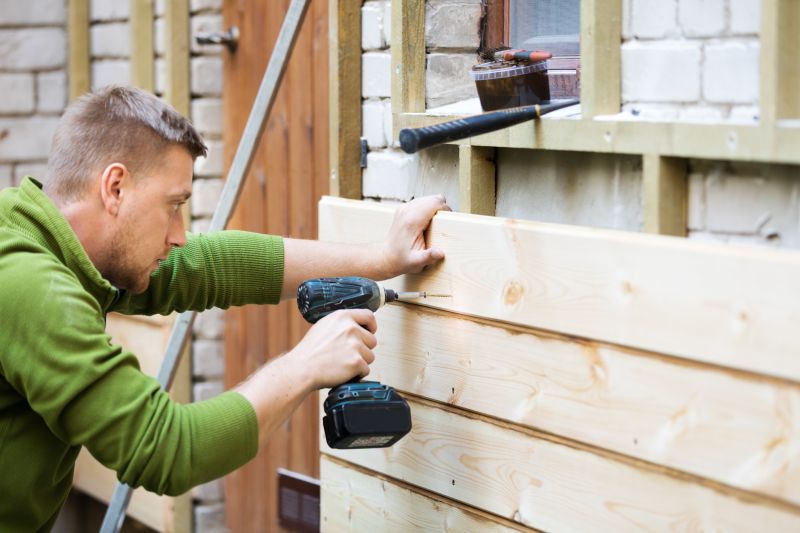Popular Siding Service Supplies To Elevate Your Craftsmanship
Learn about the most sought-after products that help contractors deliver superior siding results efficiently.
 In Seattle, Washington, maintaining the exterior of a building with quality siding is essential for both aesthetic appeal and structural integrity. Siding products come in a wide array of materials, styles, and installation methods, catering to diverse preferences and project requirements. From traditional options like vinyl and wood to modern composite and fiber cement options, property owners and contractors have numerous choices to consider. Selecting the appropriate siding products involves understanding the specific needs of the building, local climate considerations, and long-term maintenance expectations.
In Seattle, Washington, maintaining the exterior of a building with quality siding is essential for both aesthetic appeal and structural integrity. Siding products come in a wide array of materials, styles, and installation methods, catering to diverse preferences and project requirements. From traditional options like vinyl and wood to modern composite and fiber cement options, property owners and contractors have numerous choices to consider. Selecting the appropriate siding products involves understanding the specific needs of the building, local climate considerations, and long-term maintenance expectations.
Top Overall Option
Fiber Cement Siding
Fiber cement siding is a versatile and durable material that offers a balance of aesthetic appeal and resilience. It is resistant to pests, rot, and weather-related damage, making it suitable for the varied climate conditions in Seattle. Its ability to mimic the look of wood or other materials provides flexibility in design, while its low maintenance requirements can be advantageous for long-term upkeep. This type of siding is often chosen for its longevity and capacity to withstand the elements without significant deterioration over time.
Types of Products For Siding Service
Vinyl Siding
A popular and affordable option that is easy to install and maintain, available in many styles and colors.
Wood Siding
Provides a natural, classic appearance but requires regular upkeep to maintain its look and integrity.
Fiber Cement Siding
Known for its durability and resistance to pests, rot, and weather, with versatile design options.
Aluminum Siding
Lightweight and corrosion-resistant, suitable for various architectural styles.
Engineered Wood Siding
A manufactured wood product offering a similar look to traditional wood with enhanced durability.
Stone Veneer Siding
Adds a natural stone appearance to exteriors, offering aesthetic appeal and durability.
Brick Siding
Provides a classic, sturdy exterior with minimal maintenance requirements.
Metal Siding
Includes steel and other metals, known for strength and modern appearance.
Composite Siding
Combines various materials to achieve a durable and versatile siding option.
Insulated Siding
Features a layer of foam insulation for improved energy efficiency and added durability.
Stucco Siding
A textured exterior finish suitable for various architectural styles, offering good weather resistance.
PVC Siding
A type of vinyl with added UV protection, resistant to moisture and fading.
Popular Choices
Widely used for its affordability and low maintenance, available in many styles.
Favored for its durability and aesthetic versatility in various climates.
Chosen for its natural beauty, though it requires regular care.
Popular for mimicking traditional wood with enhanced resilience.
Selected for its strength and modern appearance, especially in commercial projects.
Gaining popularity for its energy-saving benefits and added durability.
Often used to add a natural stone look with lighter weight and easier installation.
A classic choice appreciated for its longevity and timeless appeal.
Valued for its resistance to corrosion and lightweight nature.
A durable, weather-resistant option with vibrant color retention.
Durability and ease of installation are often primary concerns when choosing siding products. Vinyl siding remains popular due to its affordability and low maintenance, while fiber cement offers increased resilience against weather elements common in the Pacific Northwest. Wood siding provides a classic, natural appearance but requires regular upkeep. Composite materials blend various elements to achieve a balance of aesthetics and durability, making them a versatile choice for many projects.
Proper selection of siding products can enhance a building's curb appeal and protect it from moisture, pests, and other environmental factors. It is important to consider the compatibility of siding with existing structures, the ease of repair or replacement, and the overall cost of installation and maintenance. Consulting with local siding specialists in Seattle can help ensure that the chosen products are suitable for the regional climate and building codes. Whether for a residential home or commercial property, understanding the range of available siding products can facilitate informed decision-making and successful project outcomes.
Key Buying Considerations
- Climate suitability: Ensure the siding material can withstand Seattle's weather conditions, including moisture and temperature fluctuations.
- Durability: Consider resistance to pests, rot, and weather-related damage for long-term performance.
- Maintenance requirements: Evaluate the level of upkeep needed to keep the siding looking and functioning well.
- Aesthetic options: Choose a product that complements the architectural style and personal preferences.
- Installation complexity: Determine if professional installation is recommended or if DIY is feasible.
- Cost and budget: Balance initial investment with long-term durability and maintenance expenses.
- Energy efficiency: Some siding options include insulation features that can improve building energy performance.
- Compatibility with existing structures: Ensure the new siding integrates well with current exteriors and framing.
- Availability of colors and styles: Check the variety offered to match desired aesthetics.
- Local building codes: Confirm that the siding complies with regional regulations and standards.
- Environmental exposure: Consider the siding’s resistance to moisture, UV rays, and temperature changes.
- Warranty and support: Look for products backed by manufacturer warranties and customer service.
- Environmental factors: Be aware of potential issues like moss or mold growth in damp climates.
- Repair and replacement considerations: Choose materials that are easy to repair or replace if needed.
- Long-term value: Assess the overall lifespan and performance to ensure good value over time.
